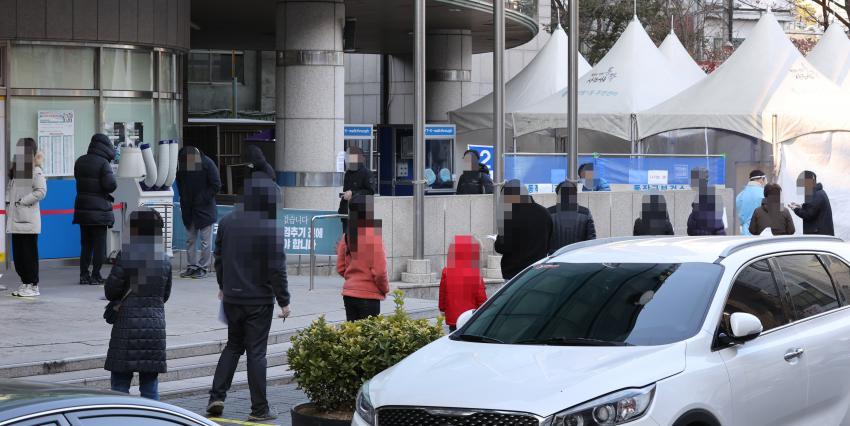Winter virus wave likely to derail consumption recovery: BOK
By YonhapPublished : Dec. 10, 2020 - 13:07

The Bank of Korea (BOK) warned Thursday that a winter wave of coronavirus outbreaks is likely to hurt the fragile recovery of private consumption.
The BOK also took a cautious tone on progress in the global coronavirus vaccine campaign, saying it will take more time to speed up the distribution of vaccines worldwide.
South Korea, which has largely brought outbreaks under control, has been facing a resurgence of virus cases in recent weeks, with the nation reporting more than 600 daily new cases on average.
"There is a possibility that a resurgence of coronavirus infections could weaken a recovery of consumption," the BOK said in a monetary policy report.
South Korea has inked deals with global drugmakers to secure COVID-19 vaccines for 44 million people.
Although the rollout of coronavirus vaccines in Britain raised hopes that the world may turn a corner in its yearlong battle against the pandemic, the BOK said, "More verifications on their safety are needed."
Last month, the BOK held its policy rate unchanged at a record low of 0.5 percent, while slightly revising up this year's economic outlook, amid growing concerns over the nation's third wave of coronavirus infections.
Driven by signs of a modest recovery in exports, the BOK revised up this year's economic growth outlook to a 1.1 percent contraction, compared with a previous forecast of a 1.3 percent retreat.
The BOK expected the economy to grow 3 percent next year, faster than a previous forecast of a 2.8 percent expansion for 2021.
The BOK predicted that consumer prices may grow 0.5 percent this year, slightly up from its previous forecast of a 0.4 percent gain. (Yonhap)
The BOK also took a cautious tone on progress in the global coronavirus vaccine campaign, saying it will take more time to speed up the distribution of vaccines worldwide.
South Korea, which has largely brought outbreaks under control, has been facing a resurgence of virus cases in recent weeks, with the nation reporting more than 600 daily new cases on average.
"There is a possibility that a resurgence of coronavirus infections could weaken a recovery of consumption," the BOK said in a monetary policy report.
South Korea has inked deals with global drugmakers to secure COVID-19 vaccines for 44 million people.
Although the rollout of coronavirus vaccines in Britain raised hopes that the world may turn a corner in its yearlong battle against the pandemic, the BOK said, "More verifications on their safety are needed."
Last month, the BOK held its policy rate unchanged at a record low of 0.5 percent, while slightly revising up this year's economic outlook, amid growing concerns over the nation's third wave of coronavirus infections.
Driven by signs of a modest recovery in exports, the BOK revised up this year's economic growth outlook to a 1.1 percent contraction, compared with a previous forecast of a 1.3 percent retreat.
The BOK expected the economy to grow 3 percent next year, faster than a previous forecast of a 2.8 percent expansion for 2021.
The BOK predicted that consumer prices may grow 0.5 percent this year, slightly up from its previous forecast of a 0.4 percent gain. (Yonhap)


![[Exclusive] Korean military set to ban iPhones over 'security' concerns](http://res.heraldm.com/phpwas/restmb_idxmake.php?idx=644&simg=/content/image/2024/04/23/20240423050599_0.jpg&u=20240423183955)
![[AtoZ into Korean mind] Humor in Korea: Navigating the line between what's funny and not](http://res.heraldm.com/phpwas/restmb_idxmake.php?idx=644&simg=/content/image/2024/04/22/20240422050642_0.jpg&u=)




![[Graphic News] 77% of young Koreans still financially dependent](http://res.heraldm.com/phpwas/restmb_idxmake.php?idx=644&simg=/content/image/2024/04/22/20240422050762_0.gif&u=)
![[Herald Interview] Why Toss invited hackers to penetrate its system](http://res.heraldm.com/phpwas/restmb_idxmake.php?idx=644&simg=/content/image/2024/04/22/20240422050569_0.jpg&u=20240422150649)





![[Exclusive] Korean military to ban iPhones over security issues](http://res.heraldm.com/phpwas/restmb_idxmake.php?idx=652&simg=/content/image/2024/04/23/20240423050599_0.jpg&u=20240423183955)



![[Today’s K-pop] Ateez confirms US tour details](http://res.heraldm.com/phpwas/restmb_idxmake.php?idx=642&simg=/content/image/2024/04/23/20240423050700_0.jpg&u=)